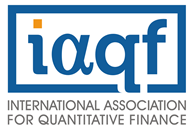Menu
Log in
|
Events / Upcoming For information about sponsoring one of our events click here or email info@iaqf.org for details. |
© Copyright 2020 International Association for Quantitative Finance |
|
Events / Upcoming For information about sponsoring one of our events click here or email info@iaqf.org for details. |
© Copyright 2020 International Association for Quantitative Finance |
